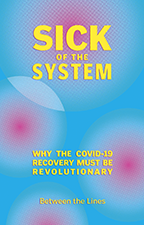
Edited by the BTL Editorial Committee
Between the Lines, 2020; 169 pp;
ISBN: 978-1-7711-3529-0.
By Rachel K. Brickner
Sick of the System is a collection of essays by activists, academics, artists, and policy-makers, exploring, as editor Richard Swift writes, “what the COVID-19 crisis reveals to them about the world we live in, how it might change because of the pandemic, and what actions we can pursue to ensure these changes work towards justice and freedom for all.” The essays, written early in the first wave, show just how quickly the pandemic exposed, and made worse, crises and injustices in Canada involving a range of issues, such as health care, working conditions, domestic violence, climate change, structural racism, the criminal justice system, legacies of colonial violence, and poverty and economic inequality.
One important through line in the essays is that these crises are the result of decades of austerity and disinvestment from communities. On health care, for example, the essay by Jane E. McArthur, Margaret M. Keith, and James T. Brophy points to funding cuts dating back to Paul Martin’s Liberal government that have continued to impact the sector, whether in terms of nursing staff shortages or failure in testing capacity. Karen Messing’s contribution illustrates how money-saving strategies in Quebec’s long-term care sector led to worse working conditions that compromised patient health. Gina Starblanket and Dallas Hunt emphasize that disinvestment in many Indigenous communities makes strategies for preventing COVID-19, such as hand washing, social distancing, and using private transportation, unfeasible.
Another theme running through the essays is the interconnected nature of many of these crises. Contributions call attention to the failures of neoliberal capitalism (Harry Glasbeek); corresponding increases in unemployment, homelessness, and dependence on food banks (John Clarke); and how the top-down response to the pandemic has reinforced capitalist, racist, and patriarchal systems (Gary Kinsman). Robyn Maynard and Justin Piché link these issues to the epidemics of structural racism and incarceration, noting that “abolition and decolonization require[s], minimally, remedying the long-standing subjugation and abandonment of Black, Indigenous, and other communities by the state by allocating resources towards housing, economic support, health and mental health care, and other necessities of life that have been denied to far too many people for far too long.”
The essays in Sick of the System call for a transformative response to these crises. There is room for the state as a critical part of the response, as Jamie Swift and Elaine Power argue in their call for a Universal Basic Income program. As some contributors note, however, it is important to be cautious of state-centric solutions. For example, even as the pandemic worsened conditions for those people currently incarcerated (Theo T., Cory B., and Jesse G.), provinces and municipalities stepped up policing capacity, which disproportionately impacted those who are already marginalized (El Jones; Alexander McClelland). Alberto Toscano asks, “Can we avoid the seemingly intractable tendency to treat crises as opportunities for a further widening and deepening of state powers, in the absence and isolation of the people?” Not surprisingly, many contributors emphasize that responses must be developed by affected communities, in a public, participatory, and democratic way (Hugh Goldring and nicole marie burton; Andrew Jackson and Emma Jackson; Julie S. Lalonde). Moreover, solutions that prioritize people must consider the planet, and so Anita Girvan asks whether it is time to put the fossil fuel industry on life support.
Another through line running through these essays is a sense that change is not only necessary, but possible. Kai Cheng Thom writes that “Even if capitalist society does somehow recover, it cannot and will not look the same as it did before. … There might be recovery. There is no going back.” Not going back means that there must be sustained activism by groups working in solidarity. John Clarke’s essay cautions that while it is not surprising that we are not currently seeing this activism, “the situation opening up in the wake of the virus will be one in which such things can change very rapidly.” We cannot say for sure whether this change will come to pass, or in what form(s). However, the contributions to this volume illustrate the many different, yet intersecting, areas where change is necessary. It is unfortunate that these powerful essays are captured in a book rather than in some other format—blogs on a website? a podcast series?— that would be accessible to a broader audience.
__________________________________
Rachel K. Brickner, professor of Politics, Acadia University.